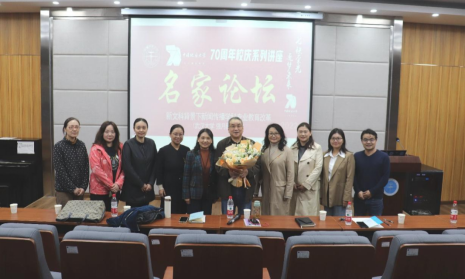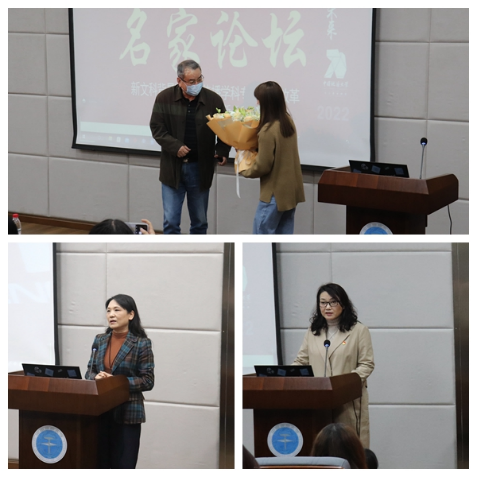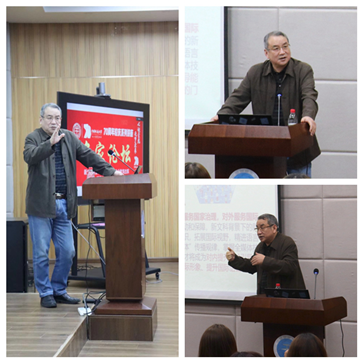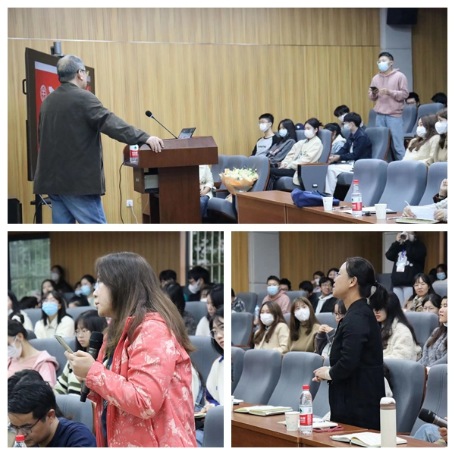To celebrate the 70th anniversary of CUG, to better promote the construction of the new liberal arts and to cultivate high-quality talents, Prof. Zhang Meizhen, Deputy Dean of the School of Arts and Communication, invited Prof. Qiang Yuexin, Dean of the School of Journalism and Communication, Wuhan University, to give a lecture entitled “Changes in Journalism and Communication Education in the Background of New Liberal Arts” at the Well-Known Experts Forum of CUG.
The lecture was held at the Academic Lecture Hall 1104 of this School at 15:00pm on October 27, 2022. Zhang Meizhen, Deputy Dean of the School, chaired the lecture, and Guo Xiurong, Secretary of the Party Committee, Yuan Yue, Deputy Dean, and teachers and students of the Department of Journalism and Communication attended the lecture together.

Guo Xiurong, Secretary of the Party Committee, introduced to the students the fruitful achievements of Prof. Qiang Yuexin in the field of journalism and communication theory and practice over the years. Prof. Qiang Yuexin is an outstanding scholar, distinguished professor, doctoral supervisor and second level professor of Wuhan University. He is currently the Dean of School of Journalism and Communication, Wuhan University, the Vice Chairman of the Teaching Steering Committee of Journalism in Colleges and Universities of the Ministry of Education, the Vice Chairman of the Journalism and Communication Professional Council of the China Association of Higher Education, and the Chairman of the Journalism and Communication Education Professional Council of Hubei Province. He has published more than 100 academic papers in important journals at home and abroad and published 6 monographs. He has presided over more than 10 projects, including major, key and general projects of the National Social Science Fund of China, major project of the Key Research Base of Humanities and Social Sciences of the Ministry of Education, and key project of the Social Science Fund of Hubei Province. He was awarded the Second Prize of National Excellent Teaching Achievements, the Second Prize of Excellent Social Science Achievements of the Ministry of Education, the Second Prize of Provincial Social Science, etc. In 2006, he was selected for the New Century Excellent Talent Support Program of the Ministry of Education, and in 2016, he was rated as a Young and Middle-Aged Expert with Outstanding ContributionS in Hubei Province.

Prof. Qiang explained the theme of the lecture from three aspects: “What is the new liberal arts”, “the impact of the new liberal arts on the journalism and communication discipline” and “the reform of the discipline talent training in this context”.

Prof. Qiang first introduced the background of the new liberal arts construction in the Chinese context. By comparing the domestic and international perspectives, combining the national strategic deployment and international cutting-edge cases, Prof. Qiang concluded that the new liberal arts construction in the Chinese context is in line with the global liberal arts education and responding to the call of the times.
Secondly, Prof. Qiang analyzed in depth the applicability, comprehensiveness and ideology of journalism and communication discipline, and conveyed for us the idea that the special characteristics of journalism and communication discipline fit with the construction of new liberal arts. Prof. Qiang also emphasized that modern science and technology are the intrinsic driver of journalism and communication discipline.
Finally, Prof. Qiang explained the major changes of disciplines and majors in the context of the new liberal arts. Colleges and universities should promote four major talent training initiatives based on the three major changes of disciplines and majors - establishing technical thinking, deepening cross-integration, meeting the practical needs, and serving national strategies, so as to cultivate excellent journalism and communication reserves suitable for the development with Chinese characteristics!
The lecture was informative and involved a wide range of subject knowledge, which not only broadened the minds of the participants, but also stimulated profound thinking and benefited the participating students and teachers. After the lecture, Prof. Qiang Yuexin answered the questions raised by students and teachers one by one. Zhang Meizhen, Deputy Dean of the School, summarized the lecture and thanked Prof. Qiang for bringing us this wonderful academic feast. The lecture ended successfully with warm applause!
